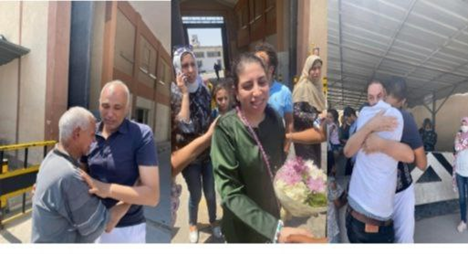
Blogger Abdelrahman “Mocha” Tarek, translator Kholoud Saied, accountant Alaa Essam, former MP Mohamed Mohie Eddin, and Hussein Khamis have been released from the pretrial detention. However, thousands of political prisoners are still suffering behind bars.
Five political prisoners who were ordered released from pretrial detention on May 29 and 30 finally walked free on 2 June, including blogger Abdelrahman “Mocha” Tarek, translator Kholoud Saied, accountant Alaa Essam, former MP Mohamed Mohie Eddin, and Hussein Khamis.
The Egyptian Commission for Rights and Freedoms (ECRF) tweeted, saying: “A short while ago, the translator Kholoud Saeed, Engineer Mohamed Mohieldin, and Hussein Khamis, were released, Thursday, from prison pending various cases. On Monday, the Public Prosecution decided to release Kholoud Saeed and others, pending various political cases.
Meanwhile, most of the other 25 detainees for whom judicial authorities issued release orders have not yet been freed.
“We welcome the long-overdue release of those detained solely for exercising their human rights—and the promise to free more,” said Amna Guellali, Amnesty International’s deputy director for the Middle East and North Africa.
“Yet thousands of opponents and critics continue to languish in Egyptian jails, while fresh arrests and prosecutions continue unabated.”
The families of two of those remaining political prisoners, former parliamentarian Ziad el-Elaimy and journalist Ahmed Allam, both made renewed calls for their relatives to be released as well.
All the released detainees were arrested almost three years ago on charges of “spreading false news”, a common accusation against government opponents.
Laywer Muhammad Ahmed wrote on Thursday that the Supreme State Security Prosecution, which handles charges of terrorism and threats to national security, had released nine Egyptians, including three women, from three separate cases launched between 2021 and 2022.
Egypt’s Abdel Fattah al-Sisi has repeatedly denied that his country holds any political prisoners, but his administration has recently launched an initiative to pardon prisoners detained in connection with political cases.
More than half of all prisoners in Egypt are political, according to the Arabic Network for Human Rights Information.
The number of prisoners in the country totaled 120,000 in March 2021, at least 26,000 of whom were held in pre-trial detention.
The Presidential Pardon Committee, tasked with facilitating prisoners’ release, was launched on 26 April during Ramadan, the month when presidential pardons have traditionally been handed out.
Sisi rose to power after ousting Egypt’s first democratically elected president, Mohamed Morsi, a leading figure in the Muslim Brotherhood, in a 2013 military coup. Since then, his government has targeted members and supporters of Morsi’s administration in a widespread crackdown. More recently, Sisi has also targeted the secular opposition.
Amnesty International on Tuesday called on the Egyptian authorities to exclude security agencies from the process of reviewing decisions on whether to grant pardons to political prisoners.
“We welcome the long-overdue release of those detained solely for exercising their human rights – and the promise to free more,” said Amna Guellali, Amnesty’s deputy director for the Middle East and North Africa.
“Yet thousands of opponents and critics continue to languish in Egyptian jails, while fresh arrests and prosecutions continue unabated,” she said, calling on the authorities to “immediately and unconditionally release anyone detained solely for exercising their human rights”.
The prisoners’ release comes after an Egyptian court on May 29 sentenced former presidential candidate Abdel Moneim Aboul-Fotouh to 15 years in prison for “spreading false news” and “incitement against state institutions”.
The family of Abdel Moneim Aboul-Fotouh, who was convicted alongside his deputy Mohamed al-Qassas and 23 others, called for Egypt’s Abdel Fattah al-Sisi not to ratify his sentence.
Aboul-Fotouh and his co-defendants were tried in an unfair emergency court—still operating despite the state of emergency ending more than seven months ago—where they cannot appeal their long prison sentences.
Ahmed Taha, a journalist and news presenter working with Al Jazeera Media Network since 2011, was sentenced in the same case to 15 years in absentia for interviewing Aboul-Fotouh in 2018 to discuss the presidential elections.
Aboul-Fotouh, 71, was arrested in 2018 after he joined a call to boycott that year’s presidential election, which Sisi won in a landslide after all candidates – except one, who was his ally – were either arrested or excluded.



